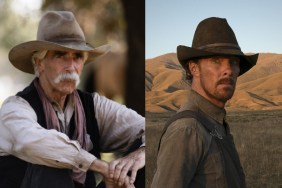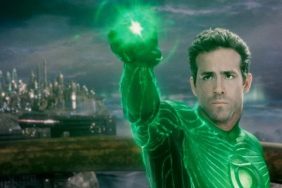David Ives does a very funny Roman Polanski impersonation. I’ve never met Roman Polanski – and the odds of that happening seem pretty slim – but hearing the playwright of Venus in Fur talk about spending weeks reworking his stageplay for the screen with Polanski and eating fabulous food together makes him sound like a pretty funny guy. Say what you will about everything else in Roman Polanski’s life – go ahead, you wouldn’t be the first – but it sounds like he knows the best places to dine, and the best dialogue to cut, even if it’s the original author’s favorite.
Related: Emmanuelle Seigner on Venus in Fur and Mary Poppins
I spoke to David Ives over the telephone and barely got a word in edgewise, so excited was he to describe the process of developing Venus in Fur – about a director (Mathieu Almaric) auditioning an actress (Emmanuelle Seigner) for his latest play about sadomasochism and getting wrapped up in her dominant mind games – and his experience living with Roman Polanski and being a big star at the Cannes Film Festival. For one night, anyway.
David Ives: What can I tell you?
CraveOnline: Wow, that is the most pleasant opening to an interview anyone has ever given me.
[Laughs.] Oh come on, people must have been pleasanter than that.
Well, there’s positive and then there’s just, “What can I tell you?” You are at my service and that’s just delightful.
[Laughs.] Where are you?
I’m in Los Angeles.
Oh I see, okay.
And where are you, sir?
I’m sitting on Broadway and 98th Street. Well, not “on” Broadway and 98th Street, but I’m in a building on Broadway and 98th Street in New York.
Well that sounds like a nicer place than my apartment right now.
Oh, I’m sorry.
Me too. What came first, the idea of Venus in Fur as a movie or the idea of Roman Polanski doing Venus in Fur as a movie?
Well, neither one. Needless to say, when the play was on here, I wondered if somebody would be interested in it as a movie, but it’s a difficult little play that way. It’s not exactly August: Osage County. So one day I came home and out of the blue there was a message on my answering machine, and this is the message: “Hello David Ives, this is Roman Polanski. I love your play! I want to do it as a movie! Call me! Here’s my phone number.” And that was it. So I called my agent and said, “You know I just had this very strange message on my answering machine.” And he said, “Was it from Roman Polanski?” and I said, “Yes, it was” and he said, “Well, I have heard from his people too and they want to do a movie.”
So that’s how it began.
What was your reaction to that? Was it, “Ooh! Roman Polanski!” or was it “Hmmm…?”
Oh, are you kidding me? I have been an enormous fan of Roman Polanski since college, and it seems to me – well, it “seemed” to me – instantly that if anybody was going to understand this material and was going to bring it to the screen it would be Roman Polanski, because oddly enough this play is sort of a compendium of things that interested him, particularly early on in his career. Like Knife in the Water, like Repulsion, The Tenant, Cul-de-sac… The themes in those movies are very close to the themes here, and they’re very claustrophobic, very erotic and there’s always a beautiful woman in them somewhere. So it seemed to me like a great idea.
Also, I was frankly very happy not to be approached by anybody in Hollywood because I made my living in Hollywood in the 90s writing scripts that went into turnaround and I know that carnival very well, and I knew that if Hollywood wanted Venus in Fur I was going to get some money, I was going to write several – probably very many – futile drafts, go through several different committees made up of 24-year-olds and then it was going to go to a different writer, and then it was going to go on the shelf and that would be the end of it.
As it was, Roman called me up just about two years ago right now; it was right after the Cannes Film Festival because his agent gave him a script there and said “You should look at this play which is a hit in New York right now” and Roman read it at the festival and he called me up, and between the Cannes Film Festival in 2012 and the film festival in 2013 he made the movie. I mean, I was at the Cannes Film Festival with the movie last year, and so in Hollywood, that’s what’s called a fairy tale.
That’s interesting that he only knew the play from reading it. Was he ever able to see a production, or is his production the only one he’s seen?
Well it’s not as if he could fly to New York and catch it on Broadway…
Granted.
No, in fact I would say it was lucky for him that he didn’t see the play because what he had was the words in front of him. He started out as an actor and he is also a genius director, and so the way we worked was he read me my play over the course of several days, line by line, word by word, page by page, and it was like having an x-ray put on the play because he had no preconceptions about what it was supposed to sound like or look like. He just knew what was there and so he attacked it as an actor/director and it was quite an education about what was good and bad about the play. [Laughs.]
Was there ever a point when he was reading the script with you that you said, “Oh, YOU should play Thomas…!”
[Laughs.] I said to him, “You should play Thomas,” and he said, “No, maybe Vanda, you know?”
This was the kind of thing that only happens in dreams, but after the deal was made – which took no time whatsoever – he called me up and I said, “So how should we do this?” Because he had made it clear from the get-go that he wanted to work on the screenplay with me, and he wanted Emmanuelle [Seigner] to play Vanda, both of which were, I thought, great ideas. So he called me up and I said “How should we work” and he said, “Oh, you could come to Paris but Paris is so loud, you know? People always want to talk to you. It’s very distracting. Maybe you and your wife could come to my house in Switzerland and we could work on it there. It’s very quiet and it’s just me and my dog.”
So I said, “Um, sure. I think my wife and I could come to Switzerland.”
How long as that trip? How long did you work on it?
It was about ten days. I would say two weeks, something like that. So we flew to Switzerland and took a car into the Alps and drove up to a very pretty chalet in Gstaad and knocked on the door and there was Roman Polanski. He said, “Why don’t you come in, have some breakfast? It’s early!” [Laughs.] So that’s where he and I worked on the screenplay over the course of a couple of weeks. He was very clear that he didn’t want to open it out or re-adapt it or rethink it. He said, “I like this play, I think we should do this play.”
Luckily for me, in Europe, or luckily for the movie, you don’t’ audition in a rehearsal room or an audition room, you audition in a real theater, which gave him more possibilities for film. So they built that set. It’s a set that they built right in the middle of Paris, in this non-descript building right in the center of Paris, and so he could move between the stage and the aisle and the audience. He had it all figured out by the time I got there how the movie would open and he knew which theater we would see in the beginning of the movie. So he had done a lot of thinking on that order before I ever got there, and so we just had the greatest time sitting in his study in Gstaad and laughing a lot, basically.
Tell me about the notions that he added cinematically, like the opening shot where you’re floating through the street into the theater. Do you think that changes, or has the potential to change one’s interpretation of the play by adding that ghostly opening, or do you think that just opens it up more?
I think… You know when we sat down the first day he told me that was what he wanted to do and I thought that was a great idea. He didn’t want to show her in the subway or something, and so he came up with that and he described it to me perfectly. It’s exactly what you see the in the movie. The thing is that anything you do with the camera is an interpretation of the script, automatically an interpretation of this play and so yes, that opening shot is interpretative but I think it is good interpretation. So I thought that was a great idea.
Was there anything while you were working with him that, as a writer, you had to say, “No, no, that has to stay in there?”
Inevitably… I don’t know how many plays I’ve written but it’s a lot, and many years of sitting with directors, and the process is always the same. There’s certain things you have to bicker over or that you go into discussion about. I would say that there was never any serious disagreement.
The most interesting moment for me was, there were these two lines in the play that I always thought were probably the greatest lines ever written in any play in English. You know, Hamlet included. And so every time I watched it in the theater I would wait for those two immortal lines to come across the footlights. So when [Polanski] got to that page he read through the page and he said, “We cut these two lines, no?” And I said, “We… what? Cut those two lines?!” And he said, “Yes! They are weak! They are stupid! We don’t need those lines! Listen to this!” and he read me the page again with those two lines and by god, he was absolutely right.
What I had done was basically insert some sort of noise into the… I had basically inserted a wild noise that it didn’t need. And he saw instantly that the tension was maintained by not raising their voices. So when you’re working with somebody who is that crisp and that clear about what is good and what is not, you hand yourself over to that person and say “do with me what you will,” in true sadomasochistic fashion.
I have to ask, what were those two lines?
I can’t tell you. I think they’re gone now. I don’t remember them exactly. Basically they could be described as shouting. [Laughs.] Rhythmical shouting.
You did write one of my favorite lines, which is something I’ve actually done myself, and it actually speaks to what you just talked about. “You sold your soul for alliteration.” I’ve done that.
[Laughs.] I do that all the time. Don’t you?
Yes, constantly!
Of course!
What is it about alliteration?
Well, I’d sold myself for shouting at that point. So it was really very easy and at night he would take us out for the most amazing meals you have ever had in restaurants overlooking the Swiss Alps. And he was generous and charming and funny and constantly solicitous and so we had a good time. The set was built in Paris and he called me up near the end of November and he said would I like to come over and rehearse with the actors. So Martha and I went back to Paris for about a week and I sat at a table in his apartment with Emmanuelle and Mathieu [Almaric] and they read through, just as he had, line by line. They talked about it and they asked questions and then we’d go out for fabulous meals in Paris. So a pattern was starting to emerge out there.
And I’d met the actors. Emmanuelle, I had no idea what she was like as a person. She wasn’t in Switzerland when we were there. I met her sitting around this table and she turned out to be so straightforward and so honest and very simple in her attack on things that it was just like his reading of the play. It was honest, straightforward and it cut right to the quick of the lines. We had a wonderful time around that table, laughing of course. He loves to laugh. And Mathieu turned out to be a fantastic, complicated, interesting human being. I had admired him in so many movies.
You know, there are two kinds of French movies now: there are Gérard Depardieu movies and there are Mathieu Almaric movies. Luckily for me, in this part I got Mathieu. [Laughs.]
I’m actually fascinated to think of a Gérard Depardieu version of this. That would be a very different film.
Can you imagine it? Imagine the movie with Gérard Depardieu as Thomas.
Are you fluent in French?
I am good enough in French. They gave it to somebody else to translate, but my reading French is very good. My spoken French is not so great. So I’ve been translating all these 17th century French verse plays, but you don’t really need to… to do that you don’t need to know how to say, “I’m going to run around to the corner, pick up a carton of milk and walk the dog,” which is something I would not have any idea how to say.
So did that make it easier?
It was all in English. We talked in English but they were reading in French, and they were asking about words and I would try to make the French translation better to what they thought was good French, good colloquial French. And then he shot it; he shot it in January of 2013, over 28 days. I was there just for the beginnings of rehearsal with the actors, which he was starting to block out the opening scene. And then he called me up and said, “We have very good news. We are going to Cannes.” And he said, “The problem is, you know, the subtitles are not very good. They gave them to an Englishman. They’re a little stiff. Do you think you could… Would you possibly consider coming to Paris for a few days and working on the subtitles?” and I said, “Sure, I’ll come to Paris.” [Laughs.]
I was in Paris four about four or five days and he and I worked on the subtitles, just the way we worked on the script. He read me the subtitles out loud and we talked over every one of them, and then we went into this studio in the suburb of Paris […] and watched a screening of the movie, subtitle by subtitle, and that brilliant young woman with the computer fixed it for us. And then we watched the movie through again with the subtitles, and Roman was amazing. He’s done this all the time, in Polish and French and English, and so he’s really extraordinarily precise. He’d say to the young woman, “Darling, would you mind if the subtitle came perhaps a third of a second later onto the screen?” And she would do that, and it would come up a third of a second later, and it was perfect. Because he could just exactly time out what the best effect was to have the subtitle arrive.
And then my wife and I, three weeks later, flew to Cannes and walked the red carpet and there was the movie and Roman Polanski and Emmanuelle Seigner, so…
How was the reaction at Cannes?
It was wonderful. It was absolutely… what I hadn’t realized was when they show a movie at Cannes, it’s a theater with 4,000 seats in it so it’s like you’re in the Roman Coliseum, you know? It’s very unnerving and very much like taking lots of speed before an exam. Roman was fantastic at the movie. The reaction was amazing. We had those roars and bravos and applause, and we all stood up. You know, you stand in the middle of the theater and he had us all stand up and he brought me forward and he said, “The words!” and everybody cheered. Then he brought forward the composer and he said, “The music!” and then he brought forward the cinematographer and he said, “The pictures!” and then brought forward the producer and he said, “The money!” [Laughs.]
Did “the money” get more applause or less?
The money got huge laughs and good applause. And then we all walked out, and what I remember most distinctly about Cannes was standing at the top of the steps at the red carpet as we were headed back for the last round of photographs as we left, and I looked at my wife and I said, “Take a good look, baby, you don’t get to see this every day.” It was an extraordinary experience in every way.
Were you interviewed on the red carpet? Did anyone ask who you were wearing?
[Laughs.] No, they took pictures of me. I was wearing a silver ball gown at the time.
Lovely.
Yeah, lovely. No, we had to do interviews before, but you know you stand and you walk and they take pictures and you get into a limo and you go to a wonderful party overlooking the Mediterranean, which is exactly what I always wanted to do as a small child. You know, I said to my mother, “Mom, what I want to do is work with a genius director and go to a party overlooking the Mediterranean.”
Wow, is there anything left for you now?
No, there’s nothing left. There’s nothing left. All I do now is sit around and eat chocolates and watch soap operas.
That sounds good too.
Yeah.
I bemoan the loss of “As the World Turns,” personally.
Me too!
Oh my god! Really?
Yeah.
Awesome. I grew up watching that show.
Yeah, everybody did. Everybody did. So what else can I tell you?
Well that’s technically our 20 minutes. If you have to go, I understand.
Oh yes, we’re right on 20 minutes. I’ve been babbling away without you asking me many questions.
Well that’s the best kind of interview. I don’t have to work very hard.
[Laughs.]
Read More Exclusive Film Channel Interviews:
William Bibbiani is the editor of CraveOnline’s Film Channel and the host of The B-Movies Podcast and The Blue Movies Podcast. Follow him on Twitter at @WilliamBibbiani.
Read More Exclusive Film Channel Interviews
-
Planes: Fire & Rescue - Dane Cook's Ninja Interview

Comedian Dane Cook goes full ninja while talking Planes: Fire & Rescue and disproving our theories of the vehicular apocalypse.
-
Sex Tape: Jason Segel & Cameron Diaz on Deleted Sex Acts

The stars of Sex Tape act out a sexual situation that got cut from the finished film. Here's a hint: donkeys.
-
Planes: Fire & Rescue - Julie Bowen Interview

Julie Bowen explains why her Emmy could beat up an Oscar while talking about Planes: Fire & Rescue.
-
Sex Tape: Rob Corddry & Ellie Kemper on Sequels

The co-stars of Sex Tape reveal their ideas for a sequel starring their supporting characters.
-
Boyhood: Ellar Coltrane on Vanquishing Social Media

Just like his on-screen counterpart, the star of Richard Linklater's Boyhood really does think that social media is evil.
-
Deliver Us From Evil: Edgar Ramirez Performs an Exorcism

EXCLUSIVE VIDEO: Watch Deliver Us From Evil star Edgar Ramirez perform an exorcism on host William Bibbiani.
-
Deliver Us From Evil: Olivia Munn Pickle Interview

EXCLUSIVE VIDEO: Watch Deliver Us From Evil star Olivia Munn offer to do unspeakable things to William Bibbiani with a pickle.
-
Boyhood: Patricia Arquette Talks Momhood and Armpits

Boyhood star Patricia Arquette compares making a movie over the course of 12 years to starring in "Medium," and relives a moment from Flirting with Disaster.
-
Earth to Echo: Director and Screenwriter Interview

Director Dave Green and screenwriter Henry Gayden discuss the robot’s homeworld and say they wanted more swearing.
-
Transformers: Age of Extinction: Ehren Kruger Interview

The screenwriter answers our questions about the film’s new sci-fi theology and the mysterious fate of Sam Witwicky.







